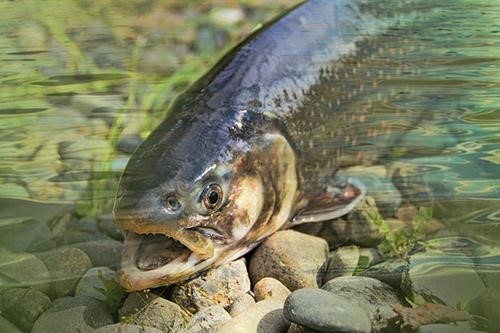AquaIMPACT will integrate fish breeding and nutrition of four main aquaculture species.
April 11, 2019

A new European research consortium will use next-generation breeding technology to produce safer, healthier and resource-efficient farmed fish, according to an announcement from The Roslin Institute in Scotland.
AquaIMPACT is a new Horizon 2020 project, which integrates the fields of fish breeding and nutrition to increase the competiveness of the European Union's aquaculture of Atlantic salmon, rainbow trout, gilthead seabream and European seabass.
The four species together represent 75% in volume and 89% in value of the total farmed finfish production in Europe, the announcement said. The aim is to ensure food and nutrition security and to satisfy consumer demands for high-quality seafood with limited environmental impact.
EU consumers eat approximately 24.3 kg of farmed fish per capita each year (data for 2016). Global seafood consumption has more than doubled in the past 15 years, and aquaculture production is still growing 5-6% annually, the institute said.
Genomic breeding technologies
"AquaIMPACT creates and implements next-generation selective breeding methodology and produces novel nutritional protocols for the genetically superior fish originating from breeding programs," said Antti Kause, project coordinator with the Natural Resources Institute Finland. "Genomic selection technology is especially suitable for a more effective improvement of traits such as disease resistance, quality and processing traits.
"To support these objectives, we develop machine learning and 'Internet of Things' to provide added value for feed development, genotyping, trait recording and data processing in practical breeding programs," Kause added.
Furthermore, the use of emerging raw materials, insect meal, single-cell organisms and novel functional additives are optimized for use in aquafeeds, the Roslin announcement said.
The solutions developed within this project will produce more nutritious, resource-efficient and healthier farmed fish, promoting industrial practices for the re-circular bioeconomy, fish welfare, zero-waste and a more efficient use of natural resources, the institute said. These, combined with communication actions, will support consumers in making sustainable and healthy food choices.
AquaIMPACT started in January 2019. The consortium consists of 11 companies and 13 research institutes with experience in developing technological advancement for the benefit of industries and consumers, Roslin said. The project is coordinated by Natural Resources Institute Finland (Luke).
Low-cost solutions
The research undertaken by Roslin as part of the AquaIMPACT project will be to develop low-cost solutions for genomic selection for disease resistance, in particular with a focus on rainbow trout, the institute said.
Roslin will also contribute to studying the genomic mechanisms by which early-life nutrition can affect the growth and health of farmed fish.
"The AquaIMPACT project is an exciting, collaborative project, which will help translate recent breeding and nutrition research for application to improve aquaculture industry production and fish health," professor Ross Houston, lead scientist at Roslin, said.
Source: The Roslin Institute, which is solely responsible for the information provided and is wholly owned by the source. Informa Business Media and all its subsidiaries are not responsible for any of the content contained in this information asset.
You May Also Like

.png?width=300&auto=webp&quality=80&disable=upscale)

